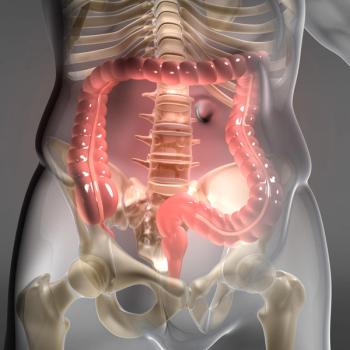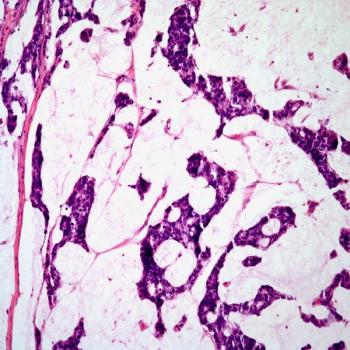
Having extramedullary disease correlated with worse PFS and OS among patients who received belantamab mafodotin for relapsed/refractory multiple myeloma.

Your AI-Trained Oncology Knowledge Connection!


Having extramedullary disease correlated with worse PFS and OS among patients who received belantamab mafodotin for relapsed/refractory multiple myeloma.

The FIBI technology, created by Farzad Fereidouni, PhD, when combined with AI eliminates the need for frozen sections and other labor-intensive oncology surgery practices.

The phase 3 INAVO120 trial reported statistically significant OS results in patients with PIK3CA-mutant, locally advanced or metastatic breast cancer.

A phase 2 trial found T-DM1 to be a tolerable treatment option for patients with HER2-positive biliary tract adenocarcinoma.

Additional progression-free survival data from the phase 3 BREAKWATER trial will be presented at future meetings.

The phase 3 INVINCIBLE-3 trial is evaluating INT230-6 vs standard of care in locally recurrent, inoperable, or metastatic soft tissue sarcoma.

Regardless of disease burden or disease progression speed on front-line therapy, trastuzumab deruxtecan appears effective in HER2-low breast cancer.

Researchers from the University of Wisconsin, Cornell, and a consortium of other institutions conducted a retrospective analysis on CD19-directed CAR T-cell therapy for R/R T-cell/histiocyte-rich LBCL.

Researchers from Bambino Gesù Children’s Hospital and Sapienza University in Rome, Italy examined the recovery and function of MAIT cells in pediatric and young adult patients following allo-HSCT.

Postoperative pulmonary complications were reduced with enhanced recovery after surgery vs control in elderly patients with non–small cell lung cancer.

Results from the DESTINY-Breast06 trial led to the approval of T-DXd for patients with unresectable or metastatic HER2-low or HER2-ultralow breast cancer.

Data from the phase 2 LITESPARK-015 trial support the sNDA for belzutifan in patients with pheochromocytoma or paraganglioma.

The major pathologic response rate improved with extended time to surgery using botensilimab plus balstilimab in resectable colorectal cancer.

At a longer follow-up, adagrasib with cetuximab maintained meaningful efficacy and elicited an ORR of 34%, results from the phase 1/2 KRYSTAL-1 showed.

The imaging agent led to changes in intended treatment plans for 48% of patients with prostate cancer and biochemical recurrence after definitive therapy.

Phase 2 data may support fruquintinib plus TAS-102 as an alternative third-line treatment in patients with metastatic colorectal cancer.

Pembrolizumab plus lenvatinib showed a safety profile consistent with previous reports evaluating the combination.

A phase 2 trial revealed survival with ramucirumab plus somatostatin was consistent with other VEGF pathways in treating advanced neuroendocrine tumors.

Patients with esophageal cancer who received palliative care consultations during end-of-life treatment experienced a decreased financial burden compared with patients who did not.

Shwetal Mehta, PhD, emphasizes her institution’s patient-focused and scientifically rigorous philosophy when developing new therapies in brain cancer.

The ALASCCA trial found that the risk of disease recurrence was reduced by 51% for patients with PIK3CA-mutated colorectal cancer who took aspirin for 3 years.

A phase 2 study evaluated the efficacy of balstilimab and botensilimab in patients with MSS metastatic mCRC without liver metastases.

The BREAKWATER trial found that encorafenib and cetuximab with mFOLFOX6 chemotherapy generated an ORR of 60.9% in BRAF V600E–mutated metastatic colorectal cancer.

Post-operative ctDNA testing led to a change in adjuvant management in 1 of 6 patients with stage II/III colorectal cancer treated in the BESPOKE trial.

Updated results support nivolumab/ipilimumab as a standard of care in patients with MSI-H or dMMR metastatic colorectal cancer.

The results of a real-world study support palliative care integration in patients with advanced early-onset colorectal cancer.

No differences in oncologic outcomes occurred between mandatory TME or selective WW strategy in rectal cancer responders to neoadjuvant therapy.

Synchronous metastatic status does not appear to affect survival among patients with resected BRAF V600E-mutated metastatic colorectal cancer.

A pCR rate of 44% was observed when neoadjuvant pembrolizumab was given to patients with dMMR colon cancer.

Post hoc analysis of the phase 3 NAPOLI 3 trial assessed how dose reductions in liposomal irinotecan/oxaliplatin affect OS in NALIRIFOX-treated PDAC.